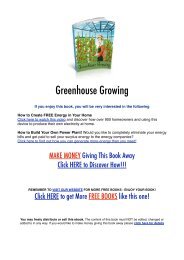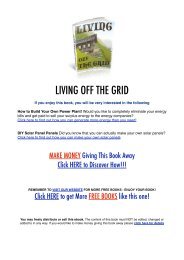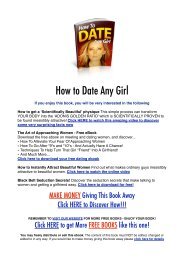Growing And Eating Organic Food
http://freebookoftheday.com/1.php?li=fbotd-eco&p=&b=organicgarden Within this ebook you will learn how to grow your own organic, healthy vegetables without making an impact on your bank balance or the environment.
http://freebookoftheday.com/1.php?li=fbotd-eco&p=&b=organicgarden
Within this ebook you will learn how to grow your own organic, healthy vegetables without making an impact on your bank balance or the environment.
You also want an ePaper? Increase the reach of your titles
YUMPU automatically turns print PDFs into web optimized ePapers that Google loves.
!<br />
What is <strong>Organic</strong> Gardening? <br />
Originally, organic gardening was understood as good<br />
old natural gardening where you put the plants in the<br />
ground and let “mother nature” take over, while you sat<br />
back and watched your garden grown. <br />
Today, organic gardening has become known by many<br />
titles including chemical-free gardening, earth-friendly<br />
gardening, and organic, but the reality of it is that<br />
although we use the term “chemical free” to mean<br />
“<strong>Organic</strong>”, but that only applies if you use no fertilizers or<br />
pesticides when creating and growing your garden. <br />
So, basically, organic gardening requires it to be done<br />
naturally without the use of fertilizers and pesticides,<br />
which means that before you start your organic garden,<br />
you need to understand a few of the essential elements<br />
that will affect your gardens growth. <br />
Essentially, organic gardening consists of understanding<br />
the following three principles: <br />
1. The Soil – Gardens require fertile soil to grow good<br />
crops; therefore the richer you can make it, the<br />
better your organic garden will be.<br />
2. Simplicity – One of the hardest things for most<br />
gardeners to do is let nature do its thing, but when<br />
organic gardening simple practices without chemical<br />
intervention work best.<br />
3. Preventative Methods and Measures –<br />
Understanding the pros and cons of the pests that
















